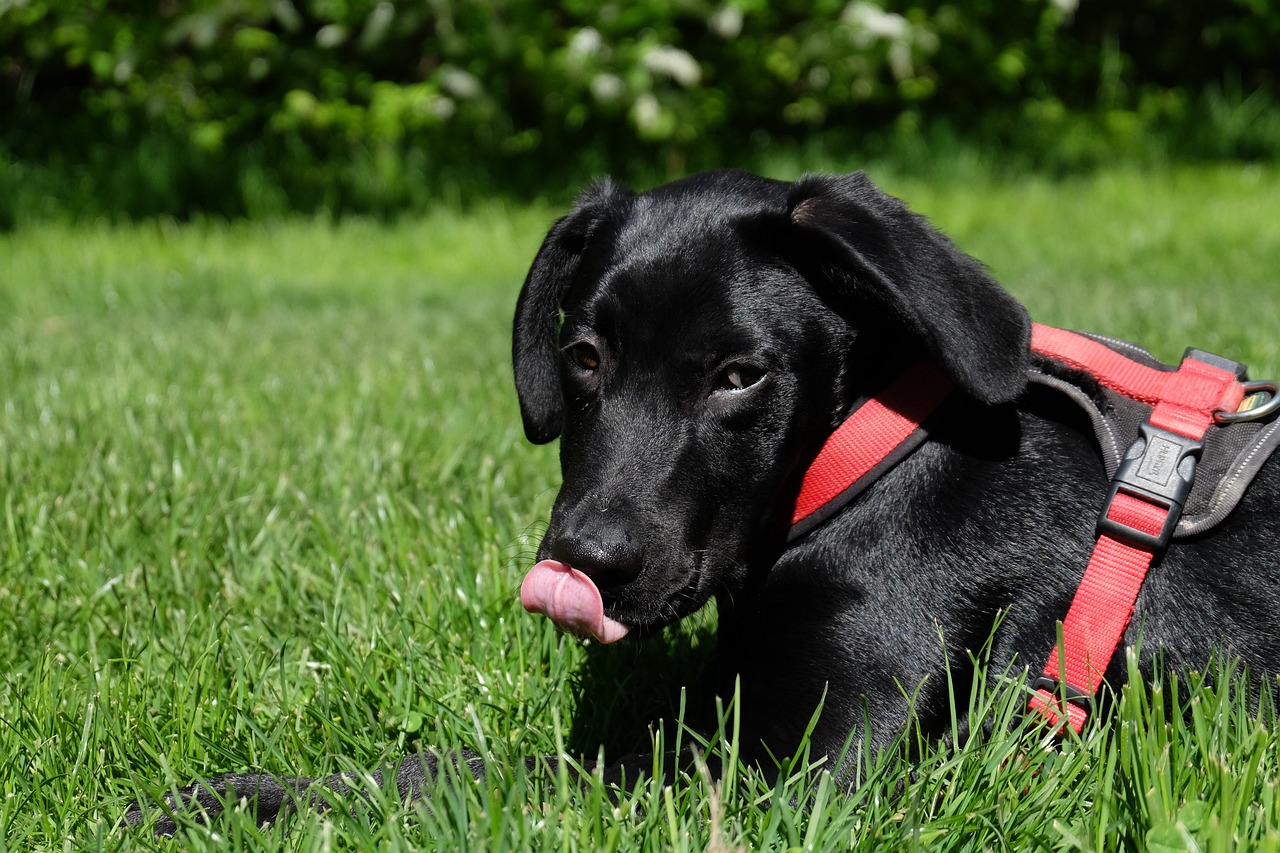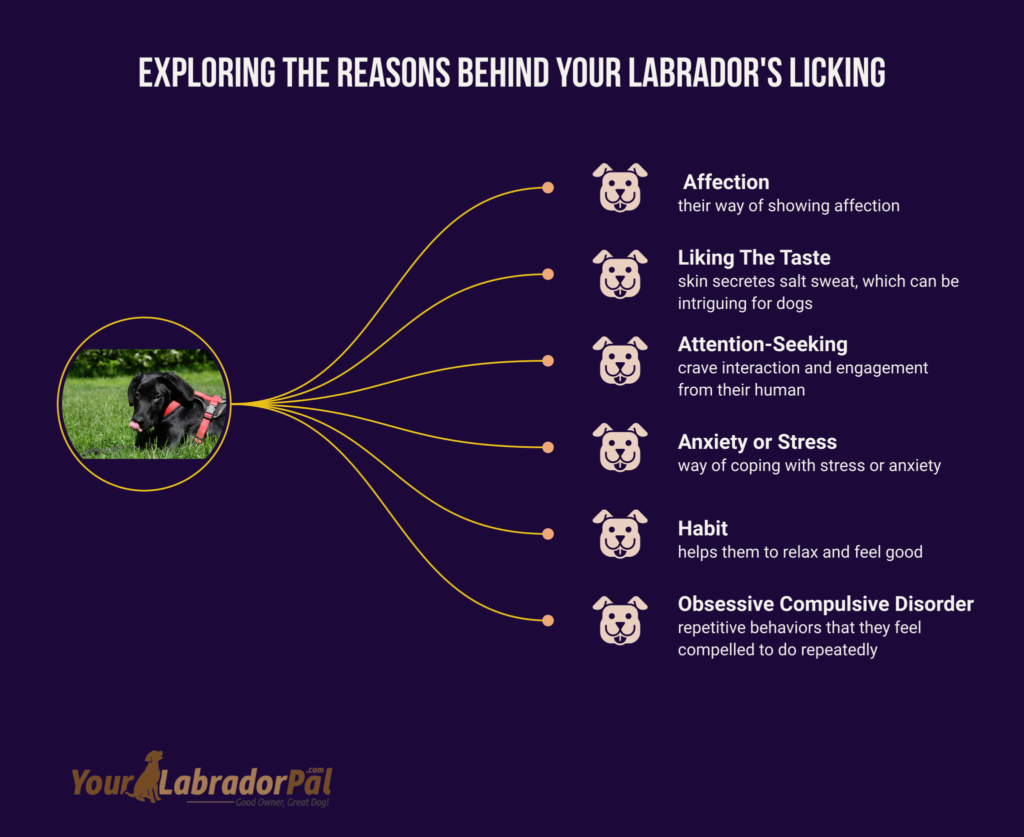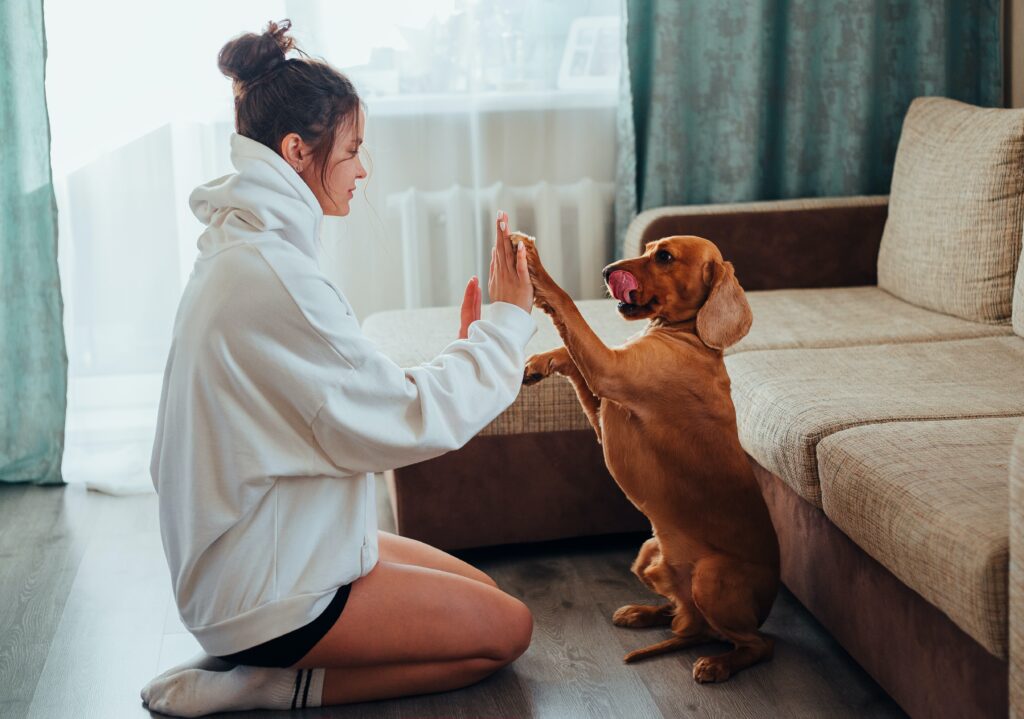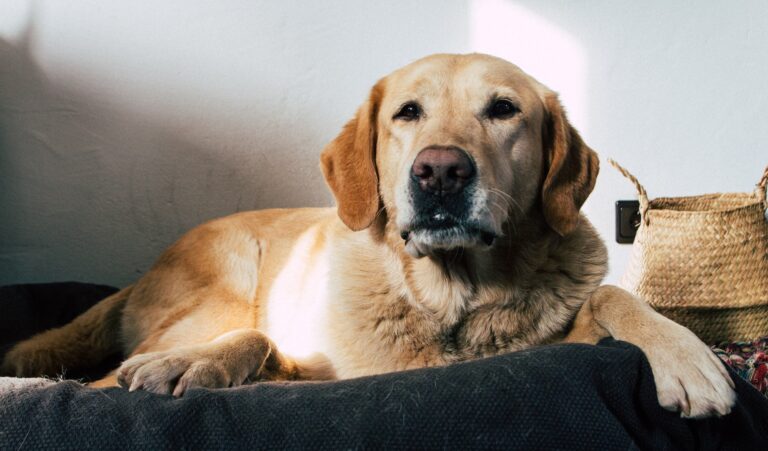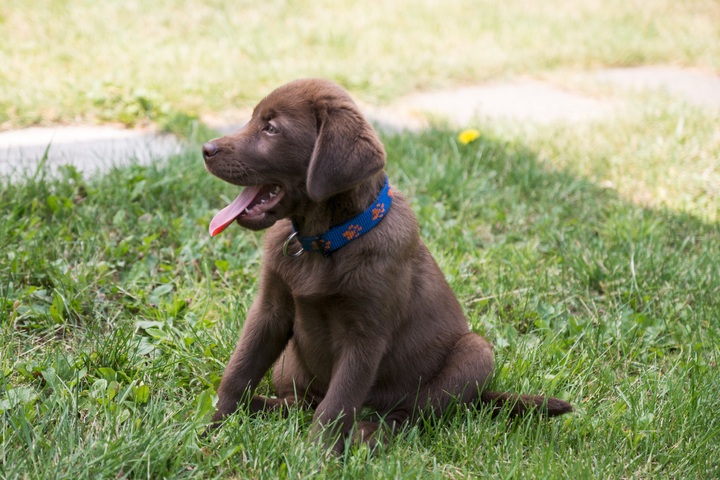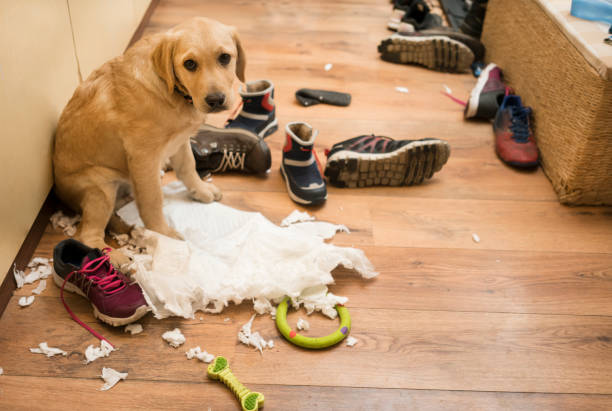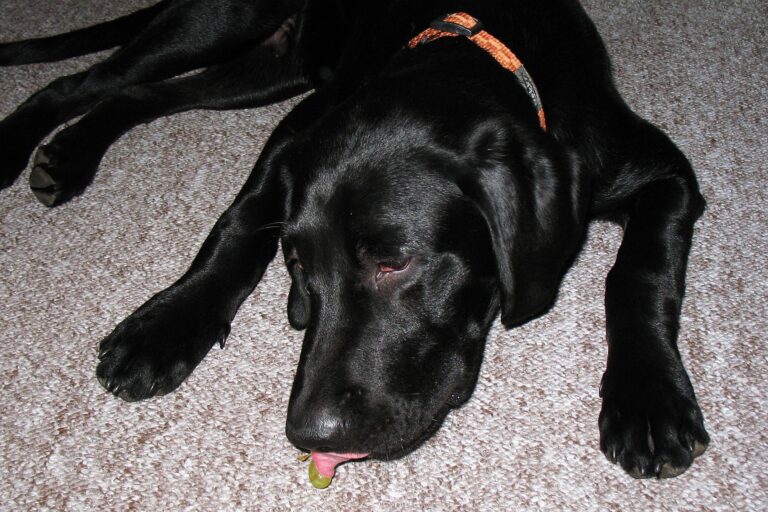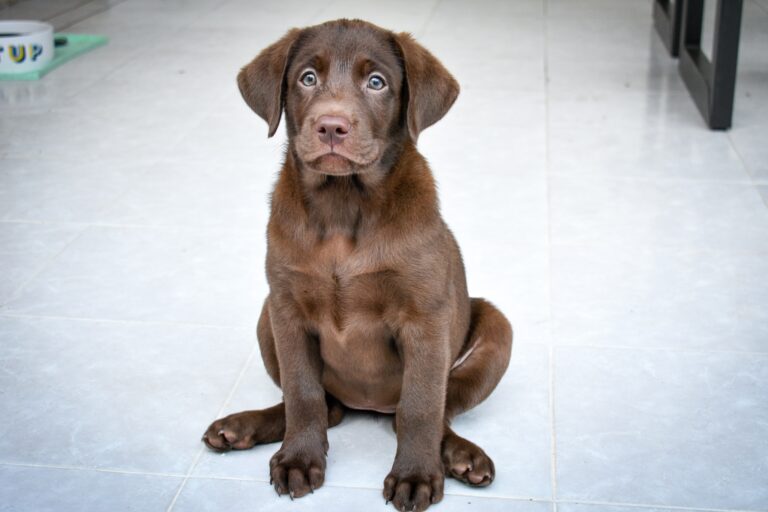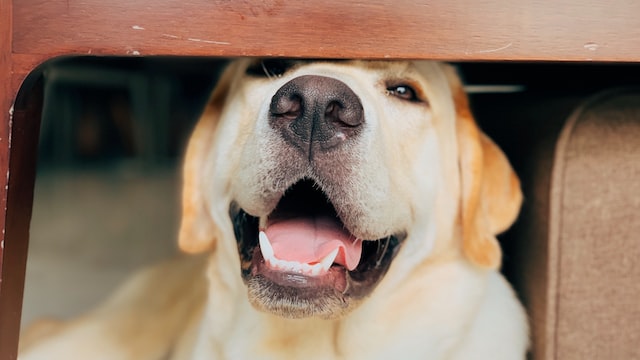Why Does My Labrador Lick Me So Much?
Have you ever been lounging on the couch, trying to enjoy a nice relaxing evening, only to be constantly bombarded by your beloved Labrador’s enthusiastic licking of your face, hands, or feet? It can be a bit overwhelming and, at times, even icky. But have you ever found yourself wondering: “Why does my Labrador lick me so much?”
Is it just a sign of love, or is there something else going on? Well, my fellow dog lover, there are a few reasons these licks are happening, some of which may surprise you. Therefore, let’s dive into the world of our canine-curious companions to find out why they can’t resist giving us a good lick.
Understanding Labrador Behavior
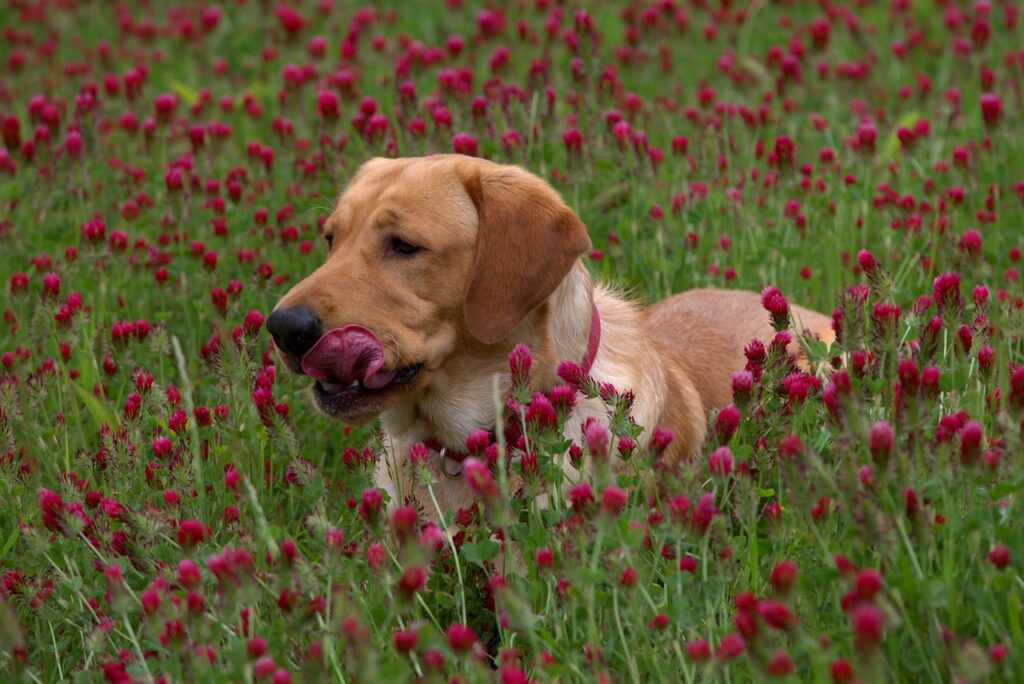
However, they can also develop some behavioral problems if not properly trained from a young age. These problems may include destructive chewing, mouthing and biting, excessive barking, resource guarding, and jumping up on people. It’s important to address these issues early on to ensure that they don’t become major problems later in life.
As Labradors age, their behavior changes. This is a good way to gauge whether your dog is growing and maturing correctly. For example, Labradors typically start to settle down and become less energetic between two and four years of age.
In terms of showing affection, Labradors have several ways of expressing their love. They might wag their tail, follow you around, lick your face, jump on you, or play with you. They are also known for being loyal and friendly, often enjoying the company of their human family members and other dogs.
Reasons Why Labradors Lick
Now that you know a bit about Labrador’s behavior, let’s explore the various reasons why they may be licking you so much.
🐕 Affection
You know, it’s quite interesting how Labradors use licking as a form of communication. When a Labrador licks you, it’s usually their way of showing affection. It’s almost like they’re giving you a big, sloppy doggie kiss!
This behavior goes back to when they were just puppies. Mother dogs lick their young to groom and stimulate their bodily functions. So, when your Labrador licks you, they’re expressing affection and reverting to this comforting, nurturing behavior from their puppyhood.
But wait, there’s more to it! Licking can also be a submissive behavior for your Labrador to say, “Hey, I respect you and acknowledge that you’re in charge here.” Isn’t that sweet?
And let’s not forget about the endorphins. Yup, you heard that right. When dogs lick, it releases endorphins, those feel-good chemicals in their brains that provide a sense of comfort and pleasure. So, in a way, it’s therapeutic for them too.
🐕 Liking The Taste
Labradors, like many other dogs, might find the taste of human skin interesting due to its salty flavor. Our skin secretes salt sweat, which can be intriguing for dogs. This is part of why you might find your Labrador licking your skin, especially after a workout or on a hot day.
Additionally, licking also provides Labradors with information about us. Dogs have an incredibly sensitive sense of taste and smell. When they lick our skin, they are able to pick up on various scents and tastes that tell them more about our health, diet, and even our emotional state.
Furthermore, licking is a natural behavior for dogs that serves multiple purposes beyond just the taste.
🐕 Attention-Seeking
Labradors are a breed known for their social and affectionate nature. They crave interaction and engagement from their human companions. Thus, when they feel ignored or just want some quality time with you, they might use licking to get your attention.
Imagine you’re engrossed in a book or your favorite TV show, and out of nowhere, your Lab starts licking your hand or face. It’s hard to ignore, right? That’s the point! It’s their way of saying, “Put that thing down and play with me!”
This behavior is not just about demanding attention; it’s also a form of communication. Dogs can’t speak our language, so they use other forms of expression, like licking, to communicate their needs, desires, and feelings.
🐕 Anxiety or Stress
If your Lab is suddenly licking a lot more than usual, especially in specific situations like loud noises, when you’re getting ready to leave the house, or during thunderstorms, it could be their way of coping with stress or anxiety. It’s kind of like how some people bite their nails or fidget when they’re nervous.
But remember, not all excessive licking is due to anxiety or stress. Sometimes, it can be caused by health issues like allergies, skin irritations, or digestive problems. Suppose you notice your Lab licking themselves excessively, especially if they’re focusing on one specific area. In that case, it’s a good idea to consult a vet to rule out potential health concerns.
🐕 Habit
If your Labrador has been licking from a young age and has continued to get a positive response, it might have become a habit for them. It’s their way of saying “hello,” showing affection, or even just passing the time.
Just imagine this scenario: every time your Lab licks you, you pet them or treat them. In their mind, they’re thinking, “Wow, every time I lick my human, I get love and treats. This is great!” And just like that, a habit is formed.
However, it’s not just about rewards. Licking can also be a self-soothing behavior. It helps them to relax and feel good.
🐕 Obsessive Compulsive Disorder (OCD)
Labradors, with their boundless energy and love for life, can sometimes develop behaviors that are a little out of the ordinary. One such behavior might be excessive licking due to Obsessive Compulsive Disorder, or OCD for short.
Now, you might be thinking, “OCD? Isn’t that a human thing?” Well, surprisingly, our furry friends can experience it too! In dogs, OCD can manifest as repetitive behaviors that they feel compelled to do repeatedly – like licking.
Imagine your Labrador is lying on their favorite rug, and they start licking their paw. It starts off as just a casual lick, but then it continues and continues and continues. Even when there’s no dirt, food, or anything on their paw, they just can’t stop licking.
This could be a sign of OCD. The behavior goes beyond the usual cleaning or grooming habit and becomes a compulsive act they can’t control. It’s like when a song gets stuck in our heads, and we can’t help but hum it all day!
One theory suggests that OCD in dogs might start as normal behaviors that get out of hand due to stress, anxiety, or boredom. It’s like their brain gets stuck in a loop, and they can’t switch it off.
How To Discourage Excessive Licking
If your Labrador’s licking is becoming a problem, the good news is that there are ways to discourage it. As a general rule of thumb, you should never punish your Lab for the behavior. However, there are certain steps you can take to reduce it:
✅ Ignore the Behavior
One of the simplest yet effective ways to discourage excessive licking is simply ignoring the behavior.
Now, I know what you’re thinking – “Ignore it? That’s it?” But hear me out! By ignoring the behavior, we’re actually not rewarding it. Dogs, including our Labs, are pretty smart creatures. They quickly figure out what behaviors get them attention, treats, or any kind of response from us.
So, let’s say your Lab starts to lick you excessively. Instead of reacting, you calmly get up and move to another room, denying them the attention they were seeking. By doing this consistently, your Lab will start to realize that licking doesn’t get them what they want. Over time, this can lead them to reduce excessive licking.
Remember, when I say ignore, it doesn’t mean neglect. Always ensure that the licking isn’t due to a health issue or discomfort. The’ ignore’ strategy can work wonders if it’s just a way to grab your attention or a quirky habit.
But patience is key here. Changing behavior doesn’t happen overnight. It might take a little time for your Labrador to catch on and break the habit.
✅ Provide Plenty of Exercises
Labradors are a high-energy breed. They were originally bred for physically demanding jobs like retrieving games, so they have a lot of natural energy to burn off. If they don’t get enough exercise, they might resort to behaviors like excessive licking out of boredom or pent-up energy.
So, how much exercise does a Labrador need? Well, the American Kennel Club recommends at least an hour a day, but this can vary depending on your Lab’s age, health, and individual energy levels. This could include walks, playtime in the backyard, fetch games, swimming, or even agility training.
✅ Mental Stimulation
Labradors are quick learners and naturally curious about the world around them. They can easily get bored if they don’t get enough mental stimulation. And a bored Lab? Well, that’s when behaviors like constant licking can start to creep in.
So, how do you provide mental stimulation for your Lab? There are plenty of ways! Interactive toys are a great start. There are loads of options out there designed to challenge your dog’s problem-solving skills. Puzzle feeders, for example, require your dog to learn how to get the treats out.
Training sessions are another fantastic way to keep your Lab’s mind sharp. Learning new commands or tricks provides mental exercise and strengthens the bond between you two.
And don’t forget about socialization. Regular playdates with other dogs or trips to new environments can be incredibly stimulating for your Lab.
By keeping your Labrador’s mind busy, you’ll help reduce their boredom and the likelihood of excessive licking.
✅ Redirect the Behavior
Another effective approach is redirecting the behavior. This means that instead of scolding or punishing your dog for licking, you should distract them by directing their attention to a more positive activity. For instance, you can offer them a toy to play with or give them a command to practice. These activities should be fun, stimulating, and engaging so the dog will forget about licking and focus on the new task.
Redirecting the behavior can work for several reasons:
- It offers a positive alternative to licking, which can become a more desirable activity for the dog.
- It helps break the compulsive licking cycle by interrupting the dog’s automatic response to certain triggers or stimuli.
- Redirecting the behavior can strengthen the dog’s and its owner’s bond, providing an opportunity for interactive play and training.
However, it is important to note that redirecting the behavior is not a one-time solution. It requires consistency, patience, and positive reinforcement to be effective.
✅ Alter Your Body’s Scent
Dogs, including Labradors, have an incredibly powerful sense of smell. In fact, their noses are between 10,000 to 100,000 times more sensitive than ours! This means they can pick up on smells we can’t even begin to detect.
Sometimes, the reason your Lab is licking you excessively could be because they’re attracted to the scent of your skin. It could be your natural scent or something on your skin, like the residue of a certain food, lotion, or even the detergent you use to wash your clothes.
So, how can you alter your scent to discourage licking? Well, one way is to avoid using strongly-scented lotions or perfumes that might attract your Lab. Instead, opt for fragrance-free products.
Another method is to use a safe, dog-friendly deterrent spray on your skin or clothes. These sprays have a taste or smell that dogs don’t like, which can discourage them from licking. Just make sure to test a small amount first to ensure it doesn’t irritate your skin or cause an allergic reaction.
✅ Train Your Labrador To Lick on Command
Now, you might be thinking, “But why on earth would I want my dog to lick me on command?” Well, the idea here is that by teaching your furry friend only to lick when you say so, you’ll be able to control their urges and prevent them from going overboard with the licking. Think of it as channeling their natural instinct into a controlled behavior.
So how do you go about training your pooch to lick on command? Here are a few steps to get you started:
- Teach the “lick” command: Start by teaching your Labrador the command “lick.” You can do this by holding a treat near your face and saying “lick” as they move towards it. Eventually, your dog will associate the word “lick” with the action of licking.
- Practice in a controlled setting: Once your dog understands the “lick” command, start practicing in a controlled setting. For example, have them sit still and command them to lick your face or hand. Reward them with a treat when they act correctly.
- Gradually increase the difficulty: As your dog becomes more comfortable with the command, gradually increase the difficulty. For example, have them perform the “lick” command in more distracting environments or when they’re feeling anxious.
The great thing about this method is that it’s not only effective, but it’s also a fun way to bond with your dog. Plus, it’s a much better alternative to punishing your furry friend for something that comes naturally to them.
✅ Use Dog Appeasing Pheromones
Dog-appeasing pheromones are synthetic versions of the pheromones that mother dogs produce to calm and soothe their puppies. When diffused in the air, they can help dogs of all ages feel more relaxed and less anxious.
One of the benefits of using dog-appeasing pheromones is that they are completely natural and safe for your furry friend. You won’t have to worry about any negative side effects or potential harm to your dog’s health. This makes them a great option for pet owners who want to take a gentle and non-invasive approach to modifying their dog’s behavior.
When it comes to excessive licking in Labradors, dog-appeasing pheromones can help by creating a calming and relaxing environment for your pup. This can help reduce stress and anxiety, often the root causes of excessive licking. By diffusing these pheromones in your home, you can help your dog feel more calm and at ease, reducing their urge to lick excessively.
Another great thing about dog-appeasing pheromones is that they are easy to use. You can find them in various forms, including diffusers, sprays, and collars. Depending on your preferences and your dog’s specific needs, you can choose the best form.
✅ Consult with a Professional
Sometimes, no matter how hard we try, our furry friends just don’t seem to listen or respond to our efforts to change their behavior. This is where a professional dog trainer or behaviorist comes in. They have a wealth of knowledge and experience in dealing with dogs that exhibit unwanted behaviors like excessive licking.
A professional dog trainer or behaviorist will assess your Labrador’s behaviors and develop personalized strategies and solutions to discourage obsessive licking. They may recommend changes in your dog’s diet, more exercise or mental stimulation, or specific training techniques to address the licking behavior.
Moreover, a professional’s intervention can also prevent further problems or issues that may arise from your dog’s excessive licking. It may lead to skin irritation, allergies, hot spots, and even infections. So, seeking professional help can potentially save you from a lot of trouble.
✅ Veterinary Check-Up
If all else fails, it’s always a good idea to take your Labrador for a check-up at the vet. I know, nobody likes a trip to the vet – least of all our furry friends! But sometimes, it’s the best course of action, especially when we’re dealing with behaviors that are out of the ordinary.
Dogs can’t tell us when they’re not feeling well or if something is bothering them. Instead, they show us through changes in their behavior – like excessive licking. This could be their way of trying to soothe themselves because of an underlying health issue.
Common conditions that could be causing your dog’s excessive licking behavior include allergies, skin infections, arthritis, and dental problems. A visit to the vet can help rule out any health problems that might be causing the excessive licking. The vet can do a thorough check-up, run some necessary tests, and provide treatment options if a health issue is found.
Frequently Asked Questions
Q: Can a dog’s saliva cause skin irritation?
A: Yes, a dog’s saliva can cause skin irritation, especially in sensitive skin people. The enzymes and bacteria found in a dog’s saliva may trigger an allergic reaction or inflammation. In order to avoid this, it’s best to keep your pet clean and use a safe, dog-friendly deterrent spray on your skin or clothes to discourage your pup from licking.
Q: How to treat the sore spot caused by excessive licking?
A: If your dog has developed a sore spot due to excessive licking, the best thing to do is to cover it with a non-stick bandage and contact your vet as soon as possible. Your vet can provide medical treatment, such as antibiotics, or suggest home remedies to speed up healing. Additionally, you should try to identify what’s causing the excessive licking and take steps to prevent it from happening again.
Q: Why does Labrador lick people that he doesn’t know?
A: While it might seem like an odd greeting, there’s a reason why Labs are known for their slobbery displays of affection. Unlike humans, dogs don’t rely on verbal communication to express themselves. Instead, they use body language and physical behaviors to convey their emotions and intentions. When a Labrador licks someone they don’t know, it’s often a sign of submission and acknowledgment. By licking someone, the dog shows they recognize the person as dominant, friendly, and non-threatening. It’s their way of saying “I mean no harm” and inviting a positive interaction.
Q: Can I use taste deterrents to discourage my Labrador from licking?
A: Yes, taste deterrents can be useful for discouraging unwanted behaviors, including licking. They’re specially designed to make the area they are sprayed on taste unpleasant and unappealing. It’s important to note that these products should only be used as part of a larger behavior modification plan, not simply as a stand-alone solution. Also, it’s important to use taste deterrents safely and only spray them on surfaces your dog cannot lick off, such as furniture or door frames.
Q: What can I use in my dog’s paw area to prevent licking?
A: Dog booties or other paw protection products can be a great way to keep your dog from licking their paws. They provide an extra layer of protection and make it more difficult for your pup to access sensitive areas on their feet. Plus, they can help protect against allergies, chemical irritants, and cuts or scrapes when dogs walk on surfaces like hot pavement or sharp rocks. Just make sure you check the fit often and replace them if necessary.
Final Words
So, there you have it! We’ve delved into the world of our lick-happy Labradors and hopefully shed some light on why your Lab might be giving you more tongue baths than you’d like. Remember, licking is a natural behavior for dogs, a way they communicate and interact with their environment. But when it becomes excessive, it’s important to understand the root cause – whether it’s a need for attention, an outlet for pent-up energy, or maybe even an underlying health issue.
We’ve discussed a bunch of strategies to manage this behavior, from ignoring it to providing plenty of exercise and even scheduling a vet check-up. It’s all about finding what works best for you and your furry friend.
But remember, every dog is unique, and what works for one might not work for another. Therefore, don’t get discouraged if the first method you try doesn’t work. Patience, consistency, and a whole lot of love are key.
Most importantly, know that all those licks, as excessive as they might be, are your Labrador’s way of saying “I love you.” So, even as we try to curb the licking, let’s remember to cherish the love behind it. After all, isn’t that why we adore these slobbery, tail-wagging companions of ours?

